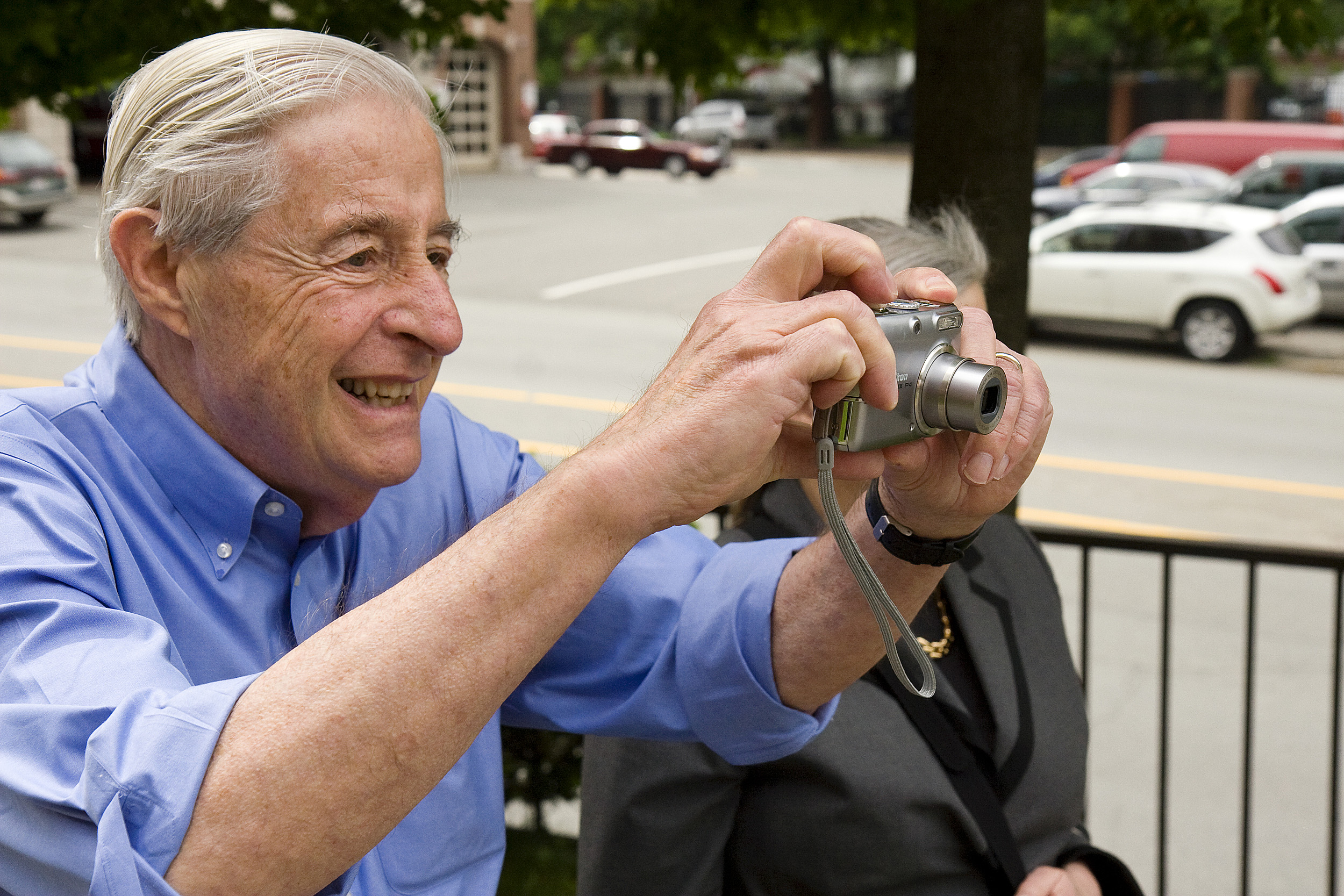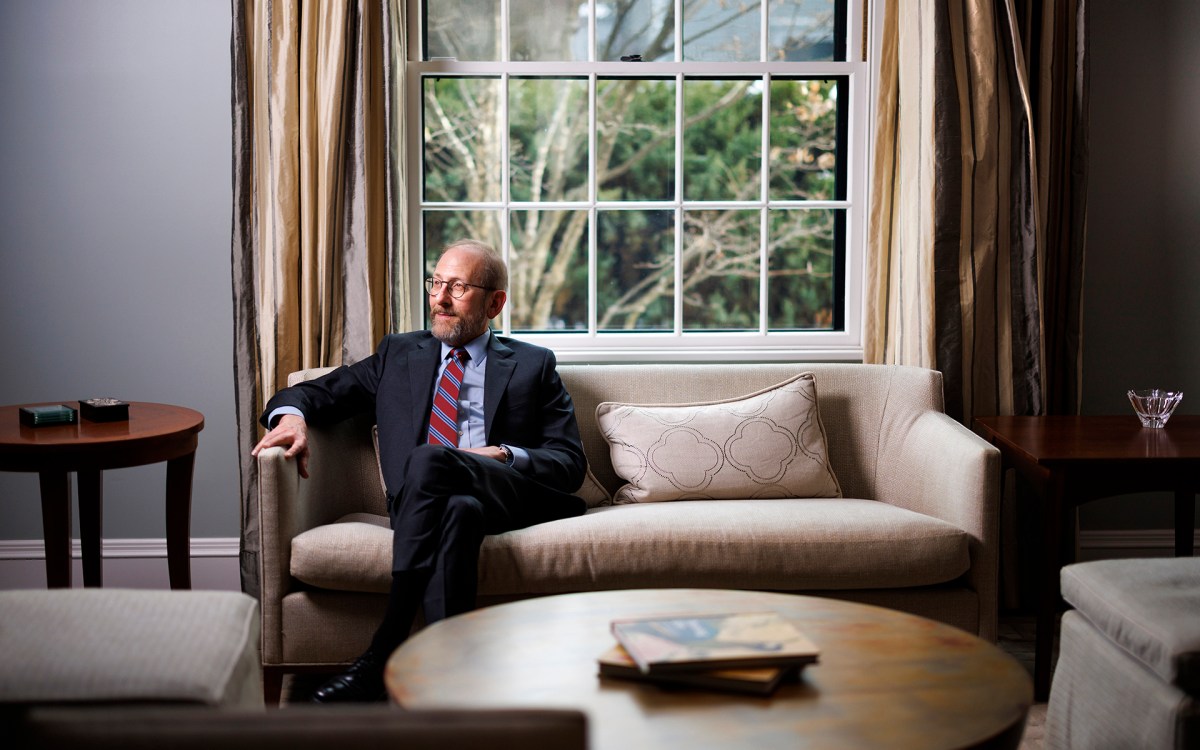
“He never believed he was better than anybody else and treated everybody as equal,” said Sidney Verba’s wife, Cynthia Verba. “He considered himself the luckiest man.”
Jon Chase/Harvard file photo
Sidney Verba dies at 86
‘What he did shaped the field of comparative politics’
Sidney Verba, one of the world’s most prominent political scientists, taught at Harvard for 35 years, holding several key administrative posts and leaving a lasting influence beyond the classroom. He died Monday at his home in Cambridge at the age of 86.
Verba, who was the Carl H. Pforzheimer University Professor Emeritus and research professor of government, undertook pioneering research on democratic participation, civic life, and political inequality. He wrote more than 20 books that examined citizen engagement and activism in democratic political life in the U.S. and around the world.
His work, done in collaboration with many scholars over five decades, showed that people with higher income and education levels tended to be more active in civic and political life, revealing, in groundbreaking studies, that political inequality is deeply embedded in American society.
“He was one of the greatest political scientists of the second half of the 20th century and the beginning of the 21st,” said Theda Skocpol, the Victor S. Thomas Professor of Government and Sociology at Harvard. “Sid had a passion for American democracy. He, along with his chief collaborators Kay Schlozman and Henry Brady, developed over the years the definitive theory and empirical research to understanding civic and political participation in the United States.”
Verba’s work was driven by his concern for bringing equality to the American political system to allow all citizens to participate in civic and political life, said Gary King, the Weatherhead University Professor and director of the Institute for Quantitative Social Science.
“If you had to say one word that Sid was about,” said King, “it was equality. … It’s not only a good thing that we have a democracy, but what really matters is the roles of people in it. He showed very often that the poor, even though they officially have the same number of votes as the rich, they have much less say in what goes on in government.”
Verba retired from teaching in 2007 but continued to work as chair of the Committee on Human Rights at the National Academy of Sciences until just a few years ago as a way to keep pursuing his intellectual interests in equality and justice.
“It was a continuum,” said Cynthia Verba, his wife of 65 years. “He was very proud of the work [the committee was] doing.”
Verba received many awards and honors for his contributions to political science. He was a member of the National Academy of Sciences, the American Philosophical Society, and the American Academy of Arts and Sciences. In 2002, he won the Johan Skytte Prize, which has been described as the Nobel Prize for political science.
As a scholar, Verba pioneered the use of survey research as central to the discipline in the 1963 book “The Civic Culture,” which he co-authored with Gabriel Almond. The groundbreaking work, which compared political attitudes in the U.S. to those in the U.K., Germany, Mexico, and Italy, revolutionized political science.
“The idea of American exceptionalism, that the United States was somehow different from everywhere else and couldn’t be compared, he just kind of blew that out of the water,” said Jennifer Hochschild, the H.L. Jayne Professor of Government, professor of African and African American Studies, and Harvard College professor. “A lot of people were influenced by the idea that you could systematically compare the United States to Mexico, to England, China, or Argentina. What he did shaped the field of comparative politics.”
“If you had to say one word that Sid was about, it was equality. … It’s not only a good thing that we have a democracy, but what really matters is the roles of people in it.”
Gary King
In the 1970s, Verba published books with several co-authors that were trailblazing in both analysis and methodology, and also set the agenda for different subfields in the discipline. Those were “Participation in America” with Norman Nie, “The Changing American Voter” with Nie and John Petrocik, and “Participation and Political Equality” with Nie and Jae-on Kim. His 1993 book “Designing Social Inquiry,” written with Gary King and Robert Keohane, is still used by every graduate student in political science.
In 1995, he published “Voice and Equality,” co-written with Schlozman and Brady. The book examined patterns of political participation in the U.S. and brought the issue of inequality in political participation to the forefront. “Participation is unequal in politics and is structured, among other things, by socio-economic resources, especially education,” said Schlozman, the J. Joseph Moakley Professor at Boston College.
Schlozman said that Verba, despite his prominence, treated junior faculty, graduate students, and even undergraduates as collaborators.
“In a certain way, Sid lived the lessons of his research,” she said. “He allowed people to have a voice in an equal way. He had a way of … letting people have their say, and he knew how to get people on board to come to some kind of consensus [so that no one felt] left out.”
Verba’s legacy was also felt beyond the classroom. He was widely beloved across the University not only because he was amiable and down-to-earth, charming everybody with his wit, self-deprecating humor, and fondness for telling jokes and stories, but also because he made time to mentor graduate students and junior faculty and possessed a special talent for bringing people together. “He was a mensch,” said Hochschild, who was a close friend of Verba’s. “He was wise, generous, and a moral leader, but one who didn’t take himself or things too seriously.”
King said that when Verba entered a room, “everybody became nicer.” On many occasions, the University tapped Verba to chair committees in charge of solving problems that seemed impossible to fix. “The way I always describe it is that whenever Sid was there, nobody would act up,” said King. “He was the adult in the room, and because the adult was in the room, no one was on bad behavior. You just couldn’t act out with Sid there.”
One of Verba’s greatest administrative feats was to unify the University’s academic calendar across all Schools and align it with those of most universities in the country. But his proudest achievement was his work at the library, said his wife.
Verba was the longest-serving director of the University Library in Harvard’s history. He held the post between 1984 and 2007, during the dawn of the digital age, and led the Library Digital Initiative, the massive digitization of its books and materials that opened the University’s collections to a global audience.
“A woman from Australia who wanted a book from Widener found out she could get it online in 24 hours and she wrote to him to say, ‘Thank you, Harvard,’” said Cynthia Verba. “That was his proudest moment, that the treasures of Harvard were opened to the world. Of all his accomplishments, that’s what he cherished the most.”
Sarah Thomas, vice president of the Harvard Library, University librarian, and the Roy E. Larsen Librarian for the Faculty of Arts and Sciences, praised Verba’s commitment to preserve and protect the University’s materials and his vision to allow people around the world access to its valuable collections. “He comes from a tradition of scholar librarians who value the tradition of preserving our cultural knowledge and the way in which it is used,” she said.
Born in New York City on May 26, 1932, a son of Jewish immigrants who owned what he described as “a mom-and-pop curtain store” in Brooklyn, Verba graduated from Harvard in 1953 and received a Ph.D. from Princeton University in 1959. Before coming to Harvard, he taught at Princeton, Stanford University, and the University of Chicago.
In a 2010 interview with Nancy Rosenblum, the associate editor of the Annual Review of Political Science, Verba credited his interest in politics to the fact that “there was always politics” in his family as he was growing up during the Depression. He had a positive outlook and saw himself as a fortunate man, said his wife. “He attributed everything to good luck,” she said. “He never believed he was better than anybody else and treated everybody as equal. He considered himself the luckiest man.”




